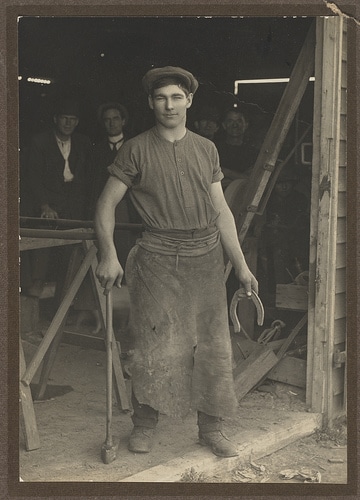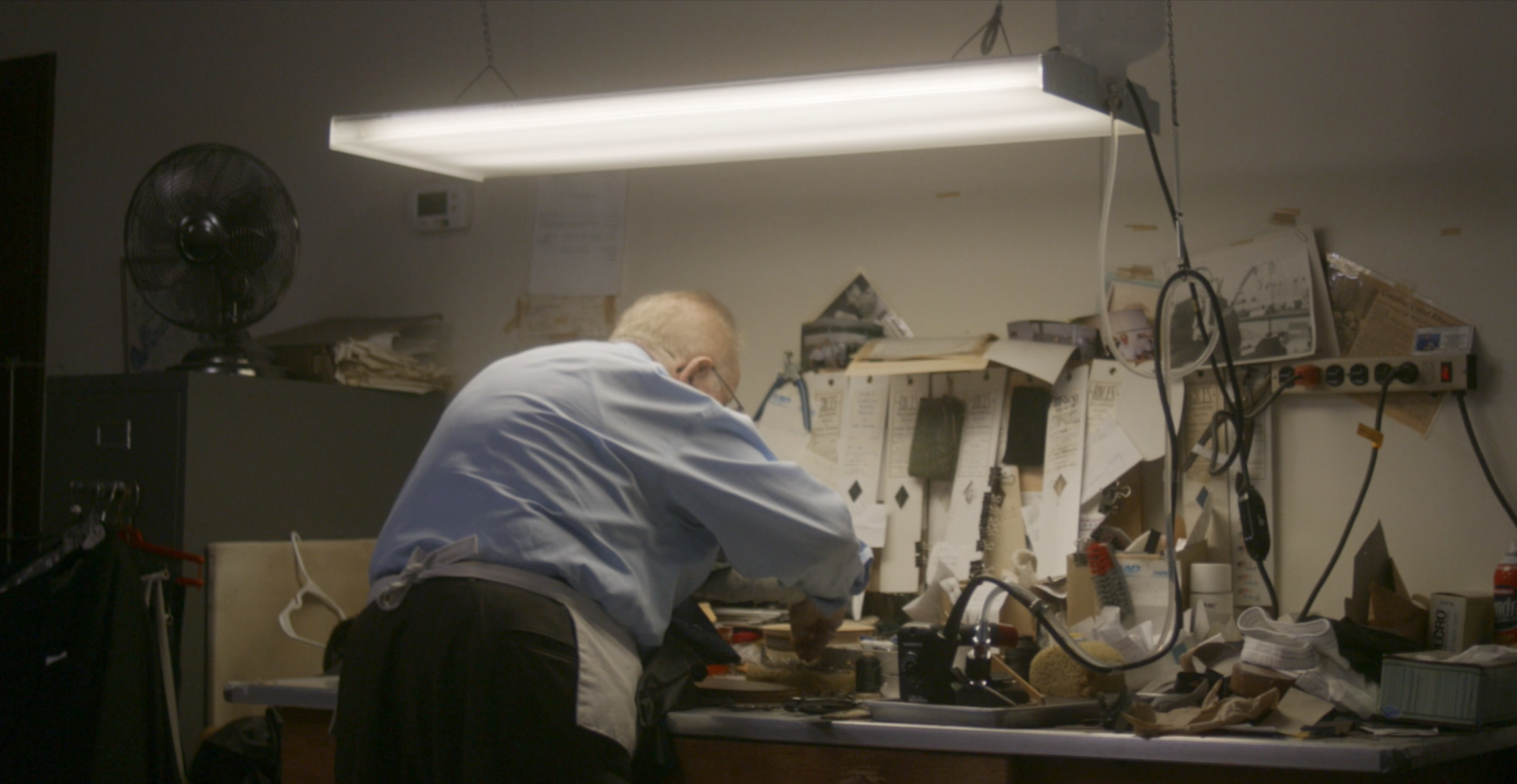
Last week we outlined how to draw up a blueprint for your life. Today we will discuss the importance of setting up shop. A craftsman’s workshop stimulates his creativity, furnishes the tools he needs to create his wares, and provides an environment that allows him to do his best work. In his shop, the craftsman feels confident and at home.
When it comes to crafting an extraordinary life, your “shop” is the place you choose to live. And just as for the traditional craftsman, this place must have the right tools, environment, and fit to unlock your full potential as a man.
The Importance of Place
When we think about crafting our lives, we tend to concentrate on two questions: “What will I do for work?” and “Whom will I marry?” These questions, the what and who questions, are certainly important. In fact, the answers to those questions constitute the two greatest determinants of our happiness.
But happiness is in fact a three legged stool, with the where question forming the third leg. This makes a great deal of sense: where we live will influence all of the other elements in our life, not just what we do and whom we marry, but the hobbies we pursue, the friends we make, the skills we learn, and how our children grow up.
For many men, where they end up is a matter of happenstance; they never leave their hometown; they take a job in a new city and settle down there; they move to follow a girlfriend and decide to stay after the break-up. But because the place we live can affect our lives in so many ways, it ought to be a decision you approach deliberately and thoughtfully. Helping you do that is the purpose of this post.
8 Factors to Consider When Choosing Where to Live
There are numerous considerations to make when thinking about relocating; these eight are among the most important to keep in mind.
Professional Opportunities
While it’s true that technology has “flattened” the world and created the possibility of being able to work anywhere, Richard Florida, foremost researcher on the importance of place and author of Who’s Your City, argues that the significance of where we live has only increased in our modern age. This is because of something he calls the “clustering force:”
When people–especially talented and creative ones–come together, ideas flow more freely, and as a result individual and aggregate talents increase exponentially: the end result amounts to more than the sum of the parts. This clustering makes each of us more productive, which in turn makes the place we inhabit even more so–and our collective creativity and economic wealth grow accordingly. This in a nutshell is the clustering force.
Florida has shown that members of the “creative class” flock together in certain locales, and he believes that moving to one of these clusters of creativity can greatly propel your career or business.
By networking and rubbing shoulders with ambitious, smart folks in a similar line of work and living in a place that is filled with innovative energy, you’ll inevitably hatch new ideas and refine your existing ones.
This is of course why musicians often move to Nashville or Austin and would-be actors head off to LA or NYC. Relocating offers opportunities to make it big and a chance to meet others with the same dreams and people who can further their career. Otherwise, one’s band might forever languish in obscurity in Pocatello, Idaho. Likewise, entrepreneurs launching a tech startup might be well served by moving near Silicon Valley, the location of not just other tech innovators but also venture capital firms, some of which will not even consider funding a company that’s headquartered more than 20 minutes away from their offices.
These creative clusters are well known, but many other professions are also concentrated in locations around the country:
Relocating to one of these places can not only further your career, but if you lost your job while living there, it would be much easier to find another opportunity without having to pick up and move.
Of course, the internet undoubtedly makes it possible to start a biz or build an audience from any locale. I launched the Art of Manliness from Tulsa, OK—a place thousands of miles from the movers and shakers on either coast. The point then is simply that moving to join together with like-minded folks could provide the energy boost needed to take your business or career to greater heights.
Aesthetics
According to Dr. Florida’s research, “The higher people rate the beauty of their community, its physical environment, and recreational offerings, the higher their overall level of community satisfaction.” The beauty of your town might not seem too important, but I’m sure we’ve all had the experience of driving around a place, seeing a cityscape, a magnificent bridge, a lovely park, or the peaks of mountains, and feeling our spirits immediately lifted. Likewise many of us have probably been in a place where there was nothing wrong with the town per se, but the ugliness of the surroundings put us in a funk. Our surroundings can affect our mood and how we feel about a place and our lives. Of course everyone has a different taste in location aesthetics; some love the sight of skyscrapers; others don’t feel at home without tree-lined streets; others feel inspired by the grittiness of reclaimed warehouses and old buildings.
Recreational Opportunities
Of course, it’s not enough for people to just gaze upon their surroundings as so much window dressing. They want their town to offer opportunities that allow them to do the kinds of things they enjoy. A cultured man will not be as happy in an old industrial city that lacks good museums and theaters. Likewise the ardent outdoorsman will not be as happy stuck in the middle of the suburbs. A man who enjoys the nightlife and good restaurants won’t be as happy in a small town where everything shuts down at 8 o’clock. If the place in which you live lacks outlets for you to pursue your recreational passions, there will inevitably be a part of yourself that feels unsatisfied. For example, as someone who loves camping and hiking, having to pack up and drive for a few hours to do so drives me kind of bonkers.
Climate and Geography
In your search after manhood go not to those delightful latitudes where “summer is blossoming all the year long,” but rather head North, to Maine, New Hampshire, and Vermont, to the coldest and flintiest parts of New England, where men work gardens with gunpowder, blast rocks to find places to plant potatoes; where, for six months of the year, the earth is covered by snow and ice. Go to the states which Daniel Webster thought good enough to emigrate from, and there you will find the highest type of American physical and intellectual manhood. -Frederick Douglass
In the 19th century, the idea that geography determined your destiny and shaped your character was quite popular. Frederick Jackson Turner’s “Frontier Thesis” contended that the wild frontier had created the peculiar American temperament—the open places had fostered a love for independence and freedom; the harsh land had spurred innovation and hardihood.
While it’s not something we think about very much these days, the geography of a place still plays a role in shaping our personalities. Folks who live in the Northeast and must battle through harsh winters still tend to be flinty just as Douglass said, while those who enjoy California’s balmy temps are more laid back.
In a study of how our personality traits are dispersed throughout the country, researchers found that personality types tend to cluster together in certain areas. Geography is only one of the factors contributing to this clustering effect, but it’s still an interesting phenomena to consider. Here are the five personality types, followed by a map that shows where the greatest concentrations of these types live.
Openness: Open people are curious, creative, adventure seekers.
Conscientiousness. Conscientious people are efficient, disciplined, organized, and dutiful.
Extraversion: Extroverted people are outgoing, energetic, and social.
Agreeableness: Agreeable people are friendly, kind, and compassionate.
Neuroticism. Neurotic people are nervous, sensitive, and prone to things like anger, anxiety, and depression.
Available Mates
If you’re having trouble finding someone to settle down with, the place you’re living in might be your worst enemy. Perhaps it is so small that the pool of available mates is tiny. Or perhaps the ratio of males to females is not in your favor:
Proximity to Family and Friends
Certainly it’s enticing to want to head off to a new, exciting city, to start over again in a place where you don’t know a soul. But will that really make you happier? According to a study by economist Nattavudh Powdthavee, regularly seeing friends and family is worth $135,000, or in other words, you’d have to make that much extra money in your new location to compensate for the hit your happiness would take in moving to a new place.
Environment for Child Rearing
Once you have kids, where you live isn’t just about you anymore. You want your kids to have the best possible upbringing. But the elements conducive to an ideal upbringing are naturally a matter of debate. There are folks that think raising a kid in the city, despite what can be cramped quarters and sub-par schools, is the way to go because of the exposure to diverse peoples and culture the children will receive. There’s the camp that thinks being raised out in the country is best, giving the kids a chance to roam free, breath fresh air, learn hands-on skills, and become more self-reliant. And then of course many parents choose to live in the suburbs, believing that a bigger house and backyard, along with good schools, compensate for the lack of the benefits found in either the city or the country.
The Cost of Living
The cost of living varies widely across the nation, particularly between the coasts and the middle of the country. The median household income in Fort Smith, AR is $35,726; the average price of a home there is $223,885. In NYC, the median household income is $60,964, and the average home price is an eye-popping $1.15 million.
Living in a city with a low cost of living has the very obvious advantage of everything simply being cheaper; for example, you can practically get a mansion in a place like Tulsa for what you would pay for a two bedroom in San Francisco.
On the flip side, Dr. Florida would argue that most expensive places are expensive because they are clusters for the creative class, and that, as we mentioned earlier, living in one of these locales could greatly propel your success and earnings in the long run. For example, those who work in the tech field in Silicon Valley make 75% more than those who work in tech elsewhere.
And as Uncle Buzz, who lives in Montpelier, Vermont, says, “You get what you pay for.” Places that are expensive tend to be so because they are highly desirable for a variety of reasons. Even though it takes a greater bite out of his paycheck, Buzz likes that it’s more expensive to live in Vermont, because it’s part of what keeps the place from being overrun; instead, only those who really want to be part of that community and are willing to pay the price, reside there.
The Necessary Trade-Offs of Place
It’s an unavoidable fact of life that no one will ever be able to incorporate every factor they desire into one place. If you want to live in NYC, you’ll have to pay high rent and probably be away from your family. If you want to live in the country, you’ll have to give up the conveniences of the burbs.
These trade-offs can seem agonizing to decide between. When I was in law school, Kate and I made a couple of visits to see Buzz in Vermont. And like thousands before us (especially in summer!), we positively fell in love with the place. After I graduated and before I took a corporate job, we decided, really on the spur of the moment, to go live there for six months. We had an awesome time during our stay, hiking, mountain biking, and canoeing; it was amazing to walk out the door and into the woods. And we were really impressed with the sense of community in the small town of Montpelier; residents work hard to preserve their town and support the local businesses. Folks are unpretentious, self-reliant, and thrifty. It’s such a unique place. We both really felt like ourselves there.
We returned to Tulsa because both of our families live here in Oklahoma, and we thought it would be beneficial to have their support when we had our first kid. And we were right. It’s been unbelievably great to have them around, to have people you can trust close by to call on for help when you’ve reached your wit’s end.
And yet the Green Mountains still call to us. I can’t think of a better place than Vermont to raise our kids. But moving there would put us very far away from our families and break a few grandparents’ hearts. What to do, what to do? It’s honestly a decision I think about all the time and still haven’t totally figured out. For now, the plan is to stay here for five years, so we can save money living in a very cheap place and be close to family when Gus and his future sibling are young. And then to move to VT. We’ll see how the trade-offs feel in a few years.
Weighing the Decision of Where to Live
Everyone will have to make these kind of trade offs in life. Here are a few things to keep in mind when you weigh your choices.
First, ask yourself these questions suggested by Dr. Florida:
- How do you like the place you’re living now?
- Is it somewhere you really want to be?
- Does it give you energy?
- Do you feel like yourself there?
- When you walk out onto the street—or the country lane—in the morning, does it fill you with inspiration, or stress?
- Does it allow you to be the person you really want to be?
- Are you achieving your personal goals?
- Is it a place you would recommend to your relatives and friends?
- Have you thought about moving?
- If so, what are the top three places on your radar screen?
- What do you like about them?
- Specifically, what do you think they offer you?
- How would your life be different in these places?
After you ponder these questions, think about the roles and goals you laid out when you created a blueprint for your life. Does the place you’re living now help or hinder your path to those goals? Would another place allow you to reach your potential to a greater degree?
Once you’ve thought through these questions, I recommend checking out this past AoM post: How to Make a Decision Like Benjamin Franklin. It provides a useful system to weigh the different factors of place that are important to you, so you can get a handle on whether moving might be the right choice.
Bloom Where You’re Planted
So that’s a cheesy maxim to be sure, but it’s a good one. You may not have the privilege of moving right now in your life. That doesn’t mean you’re destined for unhappiness or incapable of reaching your goals. When you’re happy with the “what” and “who” of your life, location becomes a lot less important. When we lived in Vermont we weren’t any happier than we were in Tulsa, our life was just different. You can choose to be happy wherever you are; no matter where you live, you can carve out a niche for yourself. Sometimes it’s even more satisfying to find like-minded people and create a niche in a place where your passion is unpopular than to be just another hipster in NYC or tech guy in San Francisco.
Listen to our podcast on how to love where you live:
Craft the Life You Want Series:
Creating a Blueprint for Your Future
Setting Up Shop, or The Importance of Where You Live
Gathering Your Tools
For more insight on mapping out your future, listen to our podcast with futurist Brian David Johnson:







